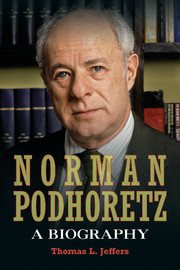Book contents
- Frontmatter
- Contents
- Illustrations
- Acknowledgments
- Prologue
- 1 Brownsville
- 2 Columbia
- 3 Cambridge
- 4 The Family and the Army
- 5 The Practicing Critic
- 6 Boss
- 7 “This Was Bigger than Both of Us”
- 8 One Shoe Drops
- 9 Dropping the Other Shoe
- 10 Liberalism Lost
- 11 George Lichtheim, Pat Moynihan, and a Lecture Tour
- 12 Domesticities, Lillian Hellman, and the Question of America's Nerve
- 13 Moynihan, Podhoretz, and “the Party of Liberty”
- 14 Breaking and Closing Ranks
- 15 Present Dangers
- 16 “The Great Satan of the American Romantic Left”
- 17 Regulated Hatreds
- 18 Culture Wars
- 19 A Literary Indian Summer
- 20 Verdicts
- 21 New Wars for a New Century
- Epilogue
- Notes
- Bibliography
- Index
7 - “This Was Bigger than Both of Us”
Published online by Cambridge University Press: 07 September 2011
- Frontmatter
- Contents
- Illustrations
- Acknowledgments
- Prologue
- 1 Brownsville
- 2 Columbia
- 3 Cambridge
- 4 The Family and the Army
- 5 The Practicing Critic
- 6 Boss
- 7 “This Was Bigger than Both of Us”
- 8 One Shoe Drops
- 9 Dropping the Other Shoe
- 10 Liberalism Lost
- 11 George Lichtheim, Pat Moynihan, and a Lecture Tour
- 12 Domesticities, Lillian Hellman, and the Question of America's Nerve
- 13 Moynihan, Podhoretz, and “the Party of Liberty”
- 14 Breaking and Closing Ranks
- 15 Present Dangers
- 16 “The Great Satan of the American Romantic Left”
- 17 Regulated Hatreds
- 18 Culture Wars
- 19 A Literary Indian Summer
- 20 Verdicts
- 21 New Wars for a New Century
- Epilogue
- Notes
- Bibliography
- Index
Summary
The prestige of science had, through much of the twentieth century, imposed a dry objectivity onto humanistic discourse. Even in literary criticism – Trilling on Wordsworth's passionate Immortality Ode, for example – the voice of the writer endeavored to be as dispassionate as possible. On the other hand, there was Lawrence's Studies in Classic American Literature, where the critic made the “I” of Cooper, Poe, Hawthorne, and the rest seem to be addressing the “I” in each of their readers. What Podhoretz noticed in the fifties was a recrudescence among the best writers of Lawrence's kind of nonfiction prose. Call it impressionistic criticism, the familiar or autobiographical essay, or, in Podhoretz's own formulation, the auto-case history.
This last phrase, awkward as it is, best describes his own memoir writing: an attempt to get beyond the merely personal – the narcissism of the Beats – and to stress, in a social-scientific vein, the typicality of a given history, his own. This was also the discovery of Mailer and James Baldwin, whose nonfiction pieces in Advertisements for Myself and Notes of a Native Son, respectively, had a power lacking in the former's The Deer Park and the latter's Giovanni's Room. If, for whatever reasons, the investment in imagining lives – creating fiction – wasn't paying dividends, perhaps it was time to recur to the facts of one's actual experience, transmuted by the imagination for dramatic purposes but avowedly historical in substance.
- Type
- Chapter
- Information
- Norman PodhoretzA Biography, pp. 83 - 102Publisher: Cambridge University PressPrint publication year: 2010



